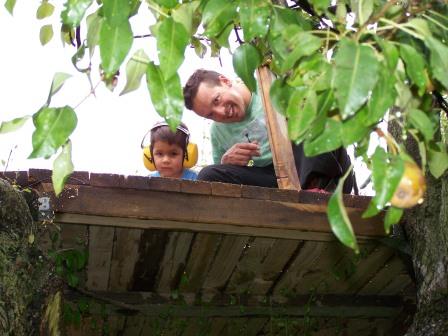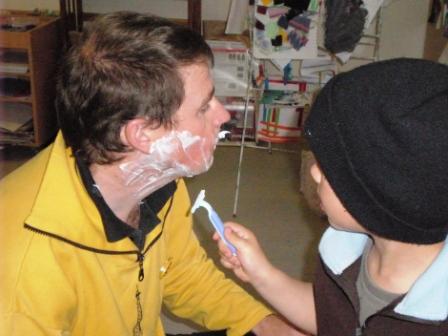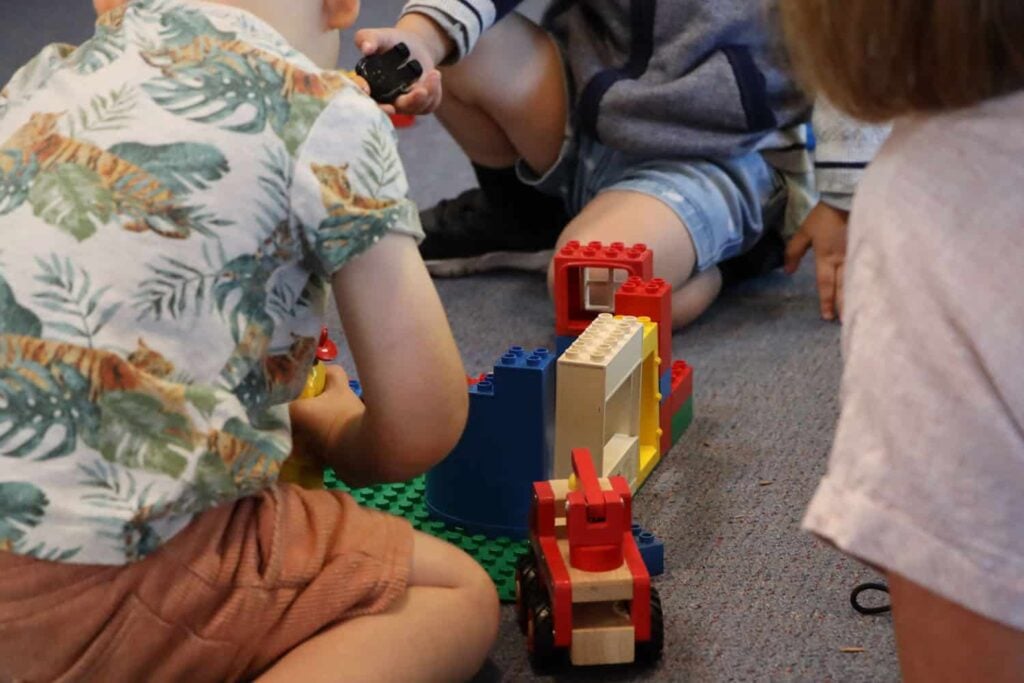Men in Childcare and Male Teachers.
Why do we need men in childcare and early education?
According to Dr Sarah Alexander, perhaps one of the main reasons for involving men in childcare is that the teaching profession should represent diversity in our society. Half of all children in early childhood education are boys – yet less than 3% of teachers are men. Additionally, having both men and women teaching in an early childhood service can help to break down role stereotypes and bring about change in the choices open to men and women in society.
In the early years children are forming their gender identity and understanding of gender roles. The gender stereotypes that boys and girls internalise from a young age shape their preferences for what they like to do and how they like to spend their time. For this reason it is more important to have men involved in the lives of young children than at any other stage (e.g. secondary and tertiary education). If children grow up in a world that is characterised by women doing the care work and men doing other work, this can have an influence on how they view themselves and what future role choices they view as open to them. Involving men in early childcare education work is a way of not reproducing gender stereotypes and a gender-based division of labour.
Dr Alexander argues that gender sensitivity is an issue that fundamentally affects the quality of children’s ECE experiences and outcomes.
A variety of research and professional literature points to a range of benefits for children and their learning:
- The involvement of men in early childhood programmes can lead to an increase in the range and variety of activities and conversation for girls and create a more “boy-friendly” environment.
- The presence of men can lead to a questioning of practices by the teaching team and management, and inspire a diversity of approaches.
- There are often certain ways that men care for children that are different from the way women care for children. For example, many men have a greater tolerance of ‘rough and tumble’ and active play.
- The involvement of men allows girls and boys to observe that men can participate in the care of children and do domestic duties (e.g. cuddle and comfort children, wipe tables and change nappies).
- The presence of a man (men) can help fathers to feel more comfortable and willing to get involved in the early childhood programme.
The Office of Early Childhood Education’s position on male teachers is that men must be recruited into early childhood teaching as well as women.
We believe that the current gender imbalance in staffing in early childhood services hampers efforts to achieve high quality learning and care for children.
The Office of ECE
Thank you to TVNZ for allowing us to share the following 2006 documentary with you. It still speaks for the situation today, as there has been little change in the sector and no government policy to address the gender segregated nature of the ECE workforce.
Why would a man want to work in Childcare?
Dr Alexander reports that in her research she has found that many of the men who take up early childhood teaching come to it, not as a first career choice, but after working for years at a job they find unsatisfying to them and where they could not make use of their interests and talents.
There are negative consequences for boys and men of not making open to them a full range of occupations and allowing the female connotation to early childhood work to remain. Men are not all the same. No man benefits from having a single form of ‘masculinity’ (of what it is to be a ‘man’) expected of them. Trying to live up to a single ‘masculine norm’ can be demeaning of the interests of different men and of them as individuals.
Continuing occupational segregation and biasing ECE to being a female job hurts women also.
Advice for encouraging teenage boys to give working in ECE a try
Dr Alexander has provided advice for encouraging teenage boys to consider ECE as a career option.
She says that there are young men who would like to work with young children but they think or are told that it is not job that is suitable for men and so they choose a different occupation.
There are also a lot of young men who need exposure to young children if they are to discover that working with children can be very rewarding – the challenge is to help young men discover they can have a connection with children in the first place
Most early childhood centres are delighted when approached by their local high school to have students visit. Centres can see this as an opportunity to inspire students to consider ECE teaching as a career and even identify potential staff for on-the-job training when they complete high school.
What can schools and career guidance counsellors do to help?
Getting male students interested could very likely be your hardest task, and those boys who are interested may be hesitant to come forward for fear of the reaction of their peers. Introduce early childhood work as a career option gradually over several months so the students, as young men, begin to feel safer to express their interest. Here is what has been found to help:
- Invite a male teacher to classes to talk to the students about his career choice and his work.
- Check that information about the occupation of ECE teaching is included at career days at the school and in any information packs on careers given to students.
- Ask their class teachers at school about ways that work with children could be incorporated into the curriculum, for example, researching the first five years of children’s development could be a topic for a health studies assignment or ECE teaching could be a topic for students’ social studies assignment.
- When talking to male students about early childhood teaching, approach it as an occupation in which boys/men can be real men. Present it as technical and challenging work and talk about the range of challenges – e.g. from working with kids who may have come from homes where they have experienced violence to administering first aid to a child who has fallen off a bike, and teaching early numeracy skills (e.g. measurement) to children in sand pit play.
- Arrange for 2 or 3 boys at a time to visit a kindergarten and spend a morning helping out.
- Talk to centre managers and owners about further possibilities that might exist for bringing boys in, such as engaging in a special building project with children or assisting as marshals at the kids’ fundraising trike-a-thon.
Ensure that all boys in a class have the experience of visiting a centre and doing activities with young children or you may find that the boys who don’t have this experience will treat those who do as ‘special’ and denigrate them as being not masculine or as ‘girls’ or ‘homos’ . Be sure to talk to the boys both before and after their visits about their expectations and experiences.
As part of organising work placements talk to the centre manager or person-in-charge about the importance of support for the male student and ensure that the student has a mentor (if it cannot be you) to support him.
What can ECE services do?
Make the students feel welcome and included.
Ensure students are not left feeling uncertain as to what to do. Set concrete tasks or give students ideas for what they might do e.g. help the children make puppets.
ECE service gender policy strategies
The need for a strategic approach and management commitment
Achieving a gender balance in your service’s staffing is unlikely to happen without a specific strategy and management commitment (Read More).
Part of the strategy must be to enable staff teams to have time and space to talk honestly in a no-blame way about gender issues, fears and biases, as part of the process of moving forward.
Recognising there is parental support rather than opposition
An argument often used against employing men in childcare is that ‘parents will be against it’. But this is usually only a small minority of parents – around 1 to 4%. Should they choose to leave a service because it employs male teachers – then that is the parents choice. However, sometimes it just takes time for a parent who may have previously had a bad experience with a person of the male gender to see that it is unfair to judge a teacher who is male in the same way.
Men’s Stories

For Joshua McKay, working in early childhood education is something of a family occupation. His wife Sarah is an ECE teacher.
Joshua says his interactions with his two young boys encouraged him to train to work with children.
“Not only do I want the best for our boys but I just enjoy spending time with them and doing great things together like building our mega tree-house in the back yard,” he says.
“They just love this interaction so much that it makes sense for me to work with other children and maybe encourage others to do the same”.
A number of men have shared their stories and you can read these.
Men in Childcare Scholarships
Men are more likely to enter early childhood teaching if we welcome them. The Men in ECE Invitation Award was designed to welcome men to embark on formal training for an ECE teaching qualification recognised by the Teaching Council for teaching in an ECE service.
If you are a man who is interested in becoming an ECE teacher, or if you would like to help as a sponsor, please contact us and let us know.









